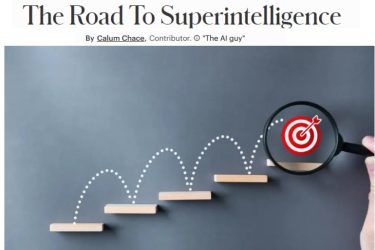 If you drop a frog into a pan of boiling water it will jump out. Frogs aren’t stupid. But if a frog is sitting in a pan which is gradually heated it will become soporific and fail to notice when it boils to death at 100 degrees. This story has been told many times, not least by the leading management thinker, Charles Handy, in his best-selling book The Age of Unreason.
If you drop a frog into a pan of boiling water it will jump out. Frogs aren’t stupid. But if a frog is sitting in a pan which is gradually heated it will become soporific and fail to notice when it boils to death at 100 degrees. This story has been told many times, not least by the leading management thinker, Charles Handy, in his best-selling book The Age of Unreason.
Unfortunately, the story isn’t true. It was put about by 19th-century experimenters, but has been refuted several times since. Never mind: it’s a good metaphor, and metaphors aren’t supposed to be literally true.
The white heat of technology
Metaphorically, we are all in boiling water now, and the heat is technology. Moore’s Law means that computers double their performance every eighteen months, and this drives the exponential improvement in artificial intelligence (AI). Pretty much every adult in the developing world knows that smartphones and other gadgets are getting smarter at an amazing rate, and you don’t hear many people argue that the progress is going to run out of steam any time soon.
But how many people are asking themselves, Where it is all heading? Well, we all lead busy lives, and we know how hard it is to forecast anything, so why bother?
Life on an exponential curve
Unfortunately, most of us don’t yet understand what being on an exponential curve means. People sometimes talk about the “knee” of an exponential curve – the point at which the past looks uneventful and the future looks like a dramatic take-off. But the reality is that you are always at the knee: on an exponential curve, the past always looks flat and the future always looks vertical. When you understand this, it makes the question of where it is all heading a compelling one.
The exponential improvement in artificial intelligence presents us with two important challenges. In the short term it brings us automation, and we don’t yet know whether that will render most people unemployed in the next two or three decades, or whether humans will manage to scamper up the value chain and keep finding new, interesting and lucrative things to do which computers can’t (yet) match. In the longer term it may bring us artificial general intelligence (AGI), and we don’t yet know whether that will be great news or terrible.
Most people aren’t thinking about these things yet: most of us are still like the frog in the slowly boiling water. But in the last year, the publication of Nick Bostrom’s book Superintelligence has woken quite a few people up to the risks posed by AGI, because leading technologists like Elon Musk and Bill Gates read it and talked about it. The fact that artificial intelligence presents us with great promise but also great challenges is now openly discussed in the mainstream media. So maybe the metaphor works after all: maybe the metaphorical frog will jump out of the metaphorical water.
Out of the pan…
And if it does, where will it jump? Will there be a rational debate about AI? Or will it become another subject where we make up our minds about what should be done before we have a complete grasp of the facts, and then filter out the evidence we receive to exclude anything which challenges our opinion? Our track record isn’t great, and we can’t afford to get this one wrong!



